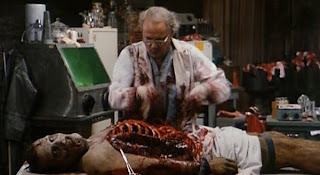If a ghost is a disembodied spirit, a zombie, by contrast, is a pure “body” creature, an empty shell whose spirit has departed—and furthermore, a walking manifestation of the basic human fear of being reduced to such base corporeality without the prospect of cerebral transcendence. As Ernest Becker writes, the mind-body dualism constitutes an existential dilemma for humankind: not only do we feel guilt over irrepressible “bodily processes and urges,” we also deplore “the constraint of the basic animal condition, the incomprehensible mystery of the body and the world.”[1]
 The term “animal condition” is quite telling, since the “othering” of zombies as animated bodies without corresponding minds, as well as human characters’ reluctance to regard them as fellow sentient beings, also clearly link them to animals. In Dawn of the Dead, referring to the zombies’ limited ability to manipulate their environment, the same scientist quoted above reminds us that “even animals will adopt the basic use of tools in this manner.” The animal analogy is most apparent in the third installment in Romero’s Living Dead series, Day of the Dead (1985). Day in effect proposes that, rather than thinking of them as expired human beings, zombies can be thought of as belonging to a different species altogether, with its own biology and behavioral codes to be studied and unraveled. In the film, Dr. Logan (Richard Liberty), nicknamed “Dr. Frankenstein” by the soldiers among whom he’s taken residence in a subterranean military compound, performs grotesque experiments on captured living dead “specimens,” with the objective of demonstrating that they can be “domesticated, conditioned to behave,” thus providing surviving humans with an alternative way of combating the zombie plague. As Logan asserts, reinstilling the zombies with “the bare beginning of social behavior, civil behavior” by means of a system of reward and punishment will return to them a portion of their lost humanity. Logan’s methods are evocative of animal-experimentation—zombies show rudimentary signs of fear and anger, fight-or-flight responses—and there are even implications of zombie-abuse, seemingly inviting a debate as to whether or not mistreatment of these “specimens” is ethically defensible. In a way, the more animalistic our view of zombies becomes, the more sympathetic or at least morally neutral they appear—since brute beasts can’t really be held responsible for their aggressive behavior, the fact that they might turn on or try and attack and prey on the living no longer seems particularly shocking or mysterious; after all, this is how animals ostensibly behave.
The term “animal condition” is quite telling, since the “othering” of zombies as animated bodies without corresponding minds, as well as human characters’ reluctance to regard them as fellow sentient beings, also clearly link them to animals. In Dawn of the Dead, referring to the zombies’ limited ability to manipulate their environment, the same scientist quoted above reminds us that “even animals will adopt the basic use of tools in this manner.” The animal analogy is most apparent in the third installment in Romero’s Living Dead series, Day of the Dead (1985). Day in effect proposes that, rather than thinking of them as expired human beings, zombies can be thought of as belonging to a different species altogether, with its own biology and behavioral codes to be studied and unraveled. In the film, Dr. Logan (Richard Liberty), nicknamed “Dr. Frankenstein” by the soldiers among whom he’s taken residence in a subterranean military compound, performs grotesque experiments on captured living dead “specimens,” with the objective of demonstrating that they can be “domesticated, conditioned to behave,” thus providing surviving humans with an alternative way of combating the zombie plague. As Logan asserts, reinstilling the zombies with “the bare beginning of social behavior, civil behavior” by means of a system of reward and punishment will return to them a portion of their lost humanity. Logan’s methods are evocative of animal-experimentation—zombies show rudimentary signs of fear and anger, fight-or-flight responses—and there are even implications of zombie-abuse, seemingly inviting a debate as to whether or not mistreatment of these “specimens” is ethically defensible. In a way, the more animalistic our view of zombies becomes, the more sympathetic or at least morally neutral they appear—since brute beasts can’t really be held responsible for their aggressive behavior, the fact that they might turn on or try and attack and prey on the living no longer seems particularly shocking or mysterious; after all, this is how animals ostensibly behave.And speaking of sympathy for zombies, here’s how advice columnist Dan Savage recently responded to an inquiry as to whether sexual relations between humans and zombies could ever be morally permissible:
“As for the morality of the situation, fucking zombies is still necrophilia, technically speaking, but practically speaking, it comes closer to bestiality. A human being who has been zombified is nothing but an animal, hungry for brains, incapable of thought, much less consent. We can kill animals for their flesh, but we mustn't fuck them, HIZZIE; we can kill zombies for wanting our flesh, but likewise we mustn't fuck them.”[2]
No comments:
Post a Comment